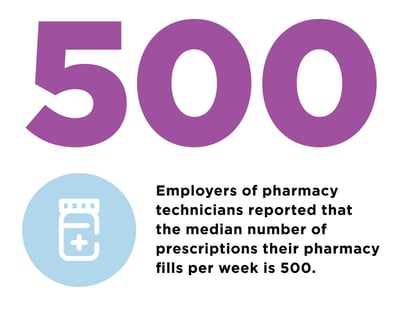Tapping pharmacy technicians as immunizers opens up greater visibility and new source of health care labor.
Sarah Carpio, BS , Valerie Wasem, BS , Joanne Canedo, BS, MS , Shane P. Desselle, PhD, RPh, FAPhA
A silver lining can be found in every cloud, according to the proverbial phrase. Although the coronavirus disease 2019 (COVID-19) pandemic can hardly be called a mere cloud, it has opened up opportunities in the pharmacy profession that are likely to continue even after the pandemic has abated.
Techs have become an integral part of the COVID-19 vaccination effort. Prior to the pandemic, techs were not relied upon frequently as vaccine immunizers. However, once the US Department of Health & Human Services (HHS) expanded the roles of techs to administer vaccines to the public,1 a previously untapped source of health care labor capital was unleashed. With it came the potential for more efficient distribution of vaccinations and greater visibility for pharmacy personnel. Programs that train techs to administer vaccines have demonstrated positive outcomes. In Idaho, 300 techs were trained, 25,000 vaccines were administered, and no adverse events have been reported to the state board at time of publication.2
The recently amended Public Readiness Emergency Preparedness (PREP) Act demonstrates how states could adopt similar legislation for techs even after HHS suspends related public health emergency declarations.1 Coinciding with the pandemic but also with other factors, various states have initiated bills expanding the scope of practice for techs to maximize efficiency without compromising patient safety. There is a movement to examine pharmacist-to-tech ratios, and economic and legal reviews have indicated this to be beneficial.3
Fulfilling Shortcomings
Pharmacy practice in the United States has been evolving toward patient-centered care to fulfill shortcomings that the biomedical model alone cannot address, such as difficulty navigating the complex health care system, health disparities across various patient groups, holes in the safety net, insufficient social support, and marginal health literacy. After years of relatively sparse attention, pharmacy technicians have become the focal point of a large number of studies published in high-impact, peer-reviewed journals. McKeirnan et al gathered patient perceptions on receiving immunizations from techs and found that those patients thought the process was convenient and safe, showing no hesitancy in receiving future services or in recommending these services to family and friends.4
Wheeler et al argued the need for a capable tech workforce to support the roles of pharmacists, making note that pharmacists practice at the top of their licenses not when more is added to their plates but when they can design their practices by delegating duties to techs as they see fit.5 This was further underscored in a study that highlighted the effectiveness of the optimizing care model, which proposes a workflow redesign that transcends tech-check-tech.5 In this study, pharmacies using the model had implemented a greater number of new value-added services while expanding existing ones, all with greater work satisfaction by pharmacists and techs, as well as high praise from district and regional managers.6
The National Association of Chain Drug Stores touts this model as a way forward and points to several states having accommodated practice change regulation in light of this model and other evidence.7 This follows other study results showing that techs have demonstrated effectiveness and safety in a variety of tasks, such as tech-check-tech and gathering medication histories from patients in hospital settings.8,9

Reducing Pharmacy Operations Costs
A recent study conducted an economic evaluation of advanced tech responsibilities.10 Results showed that increasing the skill set of techs helps reduce pharmacy operations costs—and not at the expense of pharmacists’ jobs. The study recognized, however, that more must be done to standardize technician education and training and to recognize value in certification in partnership with experiential and on-the-job activities, along with a commensurate increase in techs’ wages. These findings are commensurate with those from other recent studies.11
Sparkmon et al observed generally favorable attitudes among pharmacists in promoting tech roles in medication-dispensing support, product verification, and various nonclinical tasks to assist pharmacists with medication therapy management (MTM).12 Investing in the development and growth of techs may lead to a new source of leadership and managerial personnel for the profession. Furthermore, it is important to keep the goodwill that increased the scope of practice that techs gained during the pandemic through the PREP Act.
Techs are increasingly trusted members of the pharmacy team. Pharmacists rely on techs to assist with pharmacy operations, and community pharmacists have referred to techs as the “face” of the pharmacy because they often interact frequently with patients, helping develop customer loyalty.13 In a study by McKeirnan et al, patients’ positive relationships with pharmacy staff members increased their comfort, confidence, and trust in immunizations administered by techs, and this translated to more positive feelings about pharmacies as an appropriate venue to receive health care beyond the receipt of prescription medications.4
Building Trust is Paramount
The trust built by techs with patients is paramount. The American Society of Health-System Foundation Pharmacy Forecast 2021 discusses increases in access to health care in areas where techs have greater involvement.14 Techs can work with patients to resolve access barriers to medications and services, as in the case of logistical components with MTM as well as other programs, such as manufacturer-sponsored patient assistance. A recent report in the Annals of Pharmacotherapy indicated the importance of techs in the rising use of telepharmacy, which was predicted even prior to the onset of the pandemic.15
Pharmacy leaders should assess how expanding techs’ scope of practice will benefit the profession and the patients they serve. A consensus on adequate education and infrastructure needs, in addition to proper workflow planning, will be necessary to gain coveted roles as health educators and more formal recognition as health providers to acquire payment for cognitive services.16
The silver lining in an otherwise bleak and horrific pandemic may be the opportunity to clearly denote pharmacy as a venue for patients to obtain public health services and important health information. As the profession continues to evolve, techs must diversify their repertoire to include greater knowledge of behavioral and social aspects of care, in addition to skills in oral and written communication and leadership. This will be aided by renewed commitment from boards of pharmacy, education providers, and employers. The pandemic has set the profession on a certain path toward better recognition and better care for patients, and there is no turning back.

Sarah Carpio, BS, Valerie Wasem, BS, and Joanne Canedo, BS, MS, are PharmD candidates at Touro University California College of Pharmacy in Vallejo.
Shane P. Desselle, PhD, RPh, FAPHA, is a professor of social and behavioral pharmacy at Touro University California College of Pharmacy in Vallejo.
This article was originally featured in Pharmacy Times Pharmacy Technician Edition April 2021, Volume 2, Issue 1




